COVER- Red state blue: Warner takes 'radical centrist' campaign statewide

Mark Warner (D) is back and hoping to ride the wave of popularity that followed him out of the Governor's Mansion three years ago all the way to the U.S. Senate.
PHOTO BY SCOTT ELMQUIST
Landmark Aviation's wood-paneled terminal at Dulles Airport is everything a traditional airport terminal gate isn't.
Its lobby scattered with comfortable, overstuffed chairs and evenly tanned beautiful people in expensive casual wear, Landmark caters to a class of privileged travelers.
Like CNN's Larry King, for example. Dour-faced, he lopes with a long gait toward the door to the tarmac. King's tan has the look of a moments-ago chemical peel, almost perfectly matching his fire engine-red Members Only jacket. An airport worker follows, pushing two full luggage carts. King and his lady friend — who looks like a Carly Simon body-double— do not travel light.
The same cannot be said of the next face that appears.
Former Virginia Governor Mark Warner springs into the room in khakis, pressed white shirt, and yellow tie. This former early presidential-candidate-to-be-reckoned-with is now bounding toward the U.S. Senate, and his giant smile seems to infect a group of waiting reporters.
It's Sunday, May 4, just before 2:30pm. The topic of the day is serious: later this afternoon Warner plans to officially announce his intent to run for retiring U.S. Senator John Warner's seat. But the jokes begin even before greetings are exchanged.
"If you get on the plane, you can't get off," ribs Associated Press political writer Bob Lewis, making a vague reference to Warner's decision to quit an exploratory campaign for president in 2007 for the greater needs of his family.
"I'm getting on the plane," Warner shoots back, trademark smile in place as he starts across the lobby toward the open door.
The turboprop 15-seater that Warner and his entourage shoehorn into this day is a heck of a lot less glamorous than Air Force One— it's like a canoe with wings. But according to most of the armchair gossips, political watchers, and professional pundits, it's also much more of a sure thing in a race that pits Warner against another former governor, Jim Gilmore.
Just don't start talking about sure things with Mark Warner.
"I'm obsessed with doing this the right way," he says, firm that he's "not taking anything for granted. I'd rather be in this position than the other end of the stick, but I'm trying to make sure from a candidate standpoint that we leave no stone unturned."
Warner's return to politics comes at an apt time– not to mention the near-déjà vu of a matchup against Gilmore, whose fiscal mess Warner is credited with cleaning up with bipartisan-approved taxes as successor governor. With the country teetering on recession and many of the same fiscal bugaboos haunting politics, the return of the Northern Virginian who was able to get so much done seems to provide a glimmer of hope for Democrats.
The 44-year itch: Four reasons why Virginia could go blue in November

Could the recent success and popularity of such Virginia Democrats as Gov. Tim Kaine compel the Commonwealth to back Sen. Barack Obama (IL) for president?
FILE PHOTO BY TOM DALY
It's been 44 years since Virginia voted for a Democrat in the presidential election, when the Commonwealth's 12 electoral votes helped carry President Lyndon Johnson to his landslide victory over Arizona Senator Barry Goldwater in 1964. Now John McCain, Goldwater's Senate successor, is at the top of the Republican ticket in 2008, and Democrats once again smell the blood of red-staters in the water. Could Virginia really back a Democrat for president in 2008? These are the stars that could be aligning in the Dems' favor:
# 1 - Blue tide goes statewide
Historically, even when the Republicans have suffered their worst losses in the presidential race, the Commonwealth has stayed in the GOP's column. Even in 1976, when Jimmy Carter (D) carried every other state south of the Mason-Dixon line, Virginia's electoral votes went to Gerald Ford (R).
But it doesn't take a political scientist to see that the long-term trend in Virginia could be turning in Dem favor. From 2001 through 2006, Democrats won four of the eight campaigns for statewide office, including two consecutive (and decisive) victories for Democratic governors Mark Warner and Tim Kaine. And Jim Webb upset onetime presidential contender George Allen for his Senate seat in 2006. Compare that to the previous six-year period from 1995 through 2000, during which Democrats did not win a single campaign for statewide office, and the idea that the tide may be turning seems not so far-fetched.
Former governor Mark Warner (D) looks poised to continue the trend in November. In the latest Rasmussen Reports poll, Warner leads fellow former guv Jim Gilmore (R) by 16 points.
What does that mean for the presidential race? Since the election of Sen. William Spong (D) in 1966 marked the end of the so-called "Dixiecrat" machine, the Old Dominion has split its vote for senator and president between the two parties only once.
#2 - High turnout for the February primary
This year's Virginia Democratic presidential primary on February 12 saw a record number of voters when 986,203 Virginians turned out to pull a lever for either Senators Hillary Clinton (NY) or Barack Obama (IL)– 2.5 times as many as went to the polls four years earlier in a then-competitive race between Senators John Kerry (MA) and John Edwards (NC). That number is especially surprising when one considers that voters who decided to participate in the open Democratic primary outnumber those who opted to vote in the open Republican primary by two-to-one.
One could make the case that it's the neck-and-neck nature of the Democratic race that's driven turnout, but no one would know it was close to look at the Commonwealth. In fact, the Republican race was the tighter of the two primaries in Virginia. McCain defeated former Arkansas governor Mike Huckabee by a margin of only nine points, while Obama handed Clinton a 28-point drubbing.
#3 - McCain might not be conservative enough
While Democrat Warner won in Virginia by positioning himself as a centrist, Republicans have won in recent history by advertising themselves as unabashedly conservative.
For example, excluding Senator John Warner's unopposed run for re-election in 2002, no Republican running for governor, senate, or president in the last 15 years has won in Virginia without at least an A rating from the National Rifle Association.
That presents a big Virginia problem for McCain. In assessing the 2005-2006 Congress, the NRA slammed the senior senator from Arizona with an F.
Republicans have stuck to this trend by nominating former governor Jim Gilmore at their convention which concluded May 31. Gilmore has long been a hard-line conservative, especially on economic issues (he eliminated the state car tax when he was governor), yet Gilmore wasn't far enough to the right for a sizable minority of Virginia Republicans, who rallied behind Delegate Bob Marshall (R-Prince William). Marshall is best known as the man who drafted the constitutional amendment banning same-sex marriage and for imploring his colleagues to vote to prohibit state universities from distributing the morning-after pill by telling his House colleagues, "We have no business passing this garbage out, and making these co-eds chemical love canals for these frat house playboys."
So far, that conservative base has been less-than-enthusiastic about McCain. Right-wingers in Virginia and beyond have expressed disdain for his more moderate positions on subjects like immigration, climate change, and social issues. That ambivalence came through loud and clear in February's Republican primary, when 41 percent of the vote went to former Arkansas governor and Baptist minister Mike Huckabee, with another nine percent divided between four other candidates not named McCain.
#4 - Northern Virginia gets bigger, bluer
In the last statewide election, Jim Webb upset George Allen while carrying only four of Virginia's 11 congressional districts. How did Webb make the math work in his favor? He won two of the big ones: the 10th and the 11th in Northern Virginia.
This could represent a sea change on the shores of the Potomac. Those two D.C.-area districts are represented by Republican congressmen, and President Bush narrowly carried both of them in his 2004 re-election bid.
Combine those two newly blue districts with growing populations in the third and the eighth districts, both Democratic strongholds in the Tidewater area, and we're seeing a scenario in which a Democratic presidential candidate might make the numbers add up.
#
Still, what was true for Obama in Virginia has not played out on the national stage, as this year's primary fight has indeed been a tight one. So while it's true the Commonwealth's primary received far more attention from the campaigns and the media than it had in previous cycles, consider that Kerry and Edwards were far from finished fighting over the nomination when Virginia voted. Edwards won 29 of the Old Dominion's 82 delegates, and would debate Kerry over two weeks after the vote.
Of course, Virginia isn't the only state to see a spike in turnout for the Democratic contests this year. That's due in part to conservative radio talk show host Rush Limbaugh's so-called "Operation Chaos" strategy, in which Limbaugh encourages Republicans to vote in open Democratic primaries in order to prolong the opposition's party in-fighting. However, Limbaugh cannot take credit for the high turnout here, as Limbaugh only announced this strategy after the Virginia primary, in anticipation of the March 4 primaries in Texas and Ohio.
In 2004, McCain called a constitutional amendment banning gay marriage like the one Virginia passed in 2006 "antithetical in every way to the core philosophy or Republicans," and in 2000 he labeled the late Rev. Jerry Falwell an "agent of intolerance."
The Tri-Cities Regional Airport in Blountville, Tenn., is the nearest airport that can handle Warner's plane, which is loaded with the candidate's wife and two of his three daughters, various handlers and, of course, reporters. A friendly chat starts moments after takeoff.
It begins with thoughts on the blogosphere, moves to a discussion of Gilmore's chances against Warner, and to a play-by-play analysis of missteps in the George Allen-Jim Webb matchup. Then there's Obama, and back to blogging, and a lamentation over American newspapers' inability to stanch the loss of readers and advertisers– transitioning to a brainstorming session about how to make money on the Internet.
"Porn sites know how to do it," one reporter says.
The plane touches down.
***
The cafeteria of E.B. Stanley Middle School in Abingdon, the small southwestern Virginia town where Warner announced his gubernatorial bid in 2001, is packed with about 300 party faithful and a smattering of Republicans.
Strains of a bluegrass band lilt through the open windows— Warner is a well-known fan of the genre and even campaigned with his own bluegrass theme song back in '01— while supporters munch on barbecue, coleslaw, and pickle spears.
"In this area, Warner's pretty well-liked," says Lacy Love, 79, a chatty supporter hovering near a table full of cookies and soda. He's liked Warner since his first visit to the area while running for governor. Love says loyalty is rewarded with loyalty in these parts: "He did come back when he become governor.
"Most of the time, a Republican will win through this area," he says, while the afternoon's first politician, lanky U.S. Representative Rick Boucher— who smelled eerily like a funeral home when he was earlier making the rounds to shake hands with the crowd— takes to the microphone.
"Before [Warner], a lot of people sort of wrote a Democrat off," Love says, as Boucher bemoans to the crowd his regret that Warner is running for the Senate and not the presidency, as he did until October 2006. The crowd greets Boucher's comments with enthusiasm, but he delivers them almost with a twinge of wistfulness— of an opportunity missed.
"I think he made the wise decision," says Paul Goldman, who worked alongside Warner in 1989 on Doug Wilder's historic gubernatorial race. "I don't think he had much chance running against [Barack] Obama, John Edwards, and Hillary Clinton— it's a little question of reality. It just wasn't Mark Warner's year to run for president. Give him credit for sensing that early on.
"Otherwise, he would have ended up as Chris Dodd or Joe Biden," continues Goldman, who also preceded Warner as chairman of the state Democratic Party. "There wasn't any room: you had three supercandidates. And [Warner] can always run for president another day."
The Miller Center's Sidney Milkis agrees.
"If he had run for the presidency, he would have been looked at very closely as a vice presidential candidate," Milkis says. "He would have been in the top tier, with Edwards and Clinton and Obama, and I think he would have been more formidable than Biden or [New Mexico Governor Bill] Richardson."
As with the Senate race, Milkis says, Warner's strength as a presidential candidate would be his success as governor: "One of the things that's been talked about in this race is that there's no one with executive experience."
By running for the same Senate seat he failed to capture in 1996, Warner may be doing more than just helping secure control of the Senate for Democrats.
"I think Obama has shown he has the potential to be competitive in certain Southern states," Milkis says. "And I think it will be very helpful to have a terrific Senate candidate on the ticket with him. Dare I say Democrats would be favored to win Virginia?"
Maybe, but not if Republican strategists get wise and use Obama's record on gun control to drive a wedge between the liberal senator from Chicago and the prospective senator from Virginia– who counts among key supporters a group calling themselves "Sportsmen for Warner."
Goldman doesn't see Obama benefiting from any potential Warner success.
"There's no reverse coattails," he says dismissively, though he does acknowledge Warner could lay the framework for any hope Obama might have here. "The coattails is that people now see Democrats as fiscally responsible."
Never mind that in some ways 2008 is a flashback to 1996.
"My silver medal race," Warner calls the now infamous Warner v. Warner campaign that gave Virginians "MarkNotJohn" bumper stickers— and Mark Warner an unlikely admirer in the man he'd hoped to defeat.
In the wake of that race, the two Warners found common ground and became friends. Both are strong-minded independents– Mark is a well-known fiscal conservative, and John is well-known for his willingness to buck Republican Party leadership and take an independent stand for what he thinks is right.
Fast-forward to today. Despite Mark Warner's insistence that he's running hard, there's a certain sense of inevitability to the campaign. In some ways, Goldman suggests, Warner may find himself running a de facto incumbent's campaign. MarknotJohn has given way to a slogan that evokes John Warner's legacy: "Virginia independence." Or, as Goldman sees it, "JohnNowMark."
"I think Gilmore's really up against it," Goldman says. "[Warner] ran in 2001 against Gilmore's fiscal mismanagement, and people made up their mind. This is an election to reconfirm what everybody already knows. Warner was clearly the better governor, and people will clearly think he's the better [Senate] candidate."
***
Warner hammers the theme of independence from party politics throughout his campaign stop in Abingdon and the stops that follow. He talks of forming a "radical centrist" coalition. It has a whiff of political vagary— a Handiwipe nicety meant to win both red and blue votes.
The radical center is on display Monday, May 5, at the new fire and emergency services headquarters in downtown Roanoke where Warner again announces his Senate bid.
"Good morning, Democrats!" the first speaker shouts to a crowd of about 250 Warner faithful from a podium set against the backdrop of a gleaming red fire truck. Today there will be no bluegrass. This is the rock 'n roll Warner the PA pumping "Start Me Up" by the Rolling Stones.
This is not just a crowd of Democrats, though.
David Carson is the Republican chairman of the Roanoke City School Board, and the day after Warner's visit, he'll find out if he's won re-election. For now, he's campaigning next to the Democrat he says he first voted for in the '01 gubernatorial race.
"I've always considered myself a conservative before I consider myself a Republican," Carson told the AP the day before the fire station gig. He may as well have been speaking for Heywood Fralin, a longtime GOP contributor and father of Delegate Bill Fralin, R-Roanoke, who also appears at the rally alongside Warner.
Barry Draper is happy to see them in the Warner fold. The towering 59-year-old Roanoke County resident is decked out in a vintage "Sportsmen for Warner" T-shirt from 2001. He looks the part of a burly backwoodsman, but he sounds like a seasoned politico. He says the shirt's been folded neatly in a chest at home waiting for this day, ever since Warner became governor.
Gilmore, he says, "will never get out of the starting block."
Warren Campbell doesn't write Gilmore off. Once chairman of the county's Democratic Party, Campbell knows the lay of the land in this mountainous region of the state. "In Virginia, you cannot do that," he says of any Democrat assuming an easy victory. "[Warner] knows the campaign against Gilmore is going to get ugly."
Indeed, a preview of that came at this year's Shad Planking, the state's signature political season starter. Warner's light speech stuck to the positive. Gilmore went on the offensive, painting Warner as a tax-happy opportunist who overstated the state's financial crisis upon taking office.
"Gilmore gets up and starts attacking [Warner] right away," Campbell recounts. "That's the kind of campaign Gilmore loves."
The press releases are already flying out of Gilmore campaign headquarters, with messages that seek to recast the Warner legacy of righting a ship of state nearly capsized by Gilmore's "no car tax" chants.
"Warner created the budget deficit to justify breaking his word to the people of Virginia," reads a statement Gilmore issued shortly after Warner's official campaign kickoff. "Now he pats himself on the back to ‘fixing' a mess he created."
This is the Gilmore Warner has to watch, Goldman says. "Sometimes," he says, "being an underdog is a good place to be."
***
Warner's entourage packs in tight for the 10am trip to Norfolk. This is a former Secretary of the Navy John Warner's turf. And this is where Mark Warner wants to let people know he's the voice for "Virginia independence" that can take up the Warner mantle.
The battleship U.S.S. Wisconsin and its twin-front 16-inch turrets are a lot more impressive at his back than yesterday's fire truck. Yesterday, it was rock and roll. Today it's an oom-pah band. Yesterday it was Republicans standing shoulder-to-shoulder with the Democrat Warner. Today it's top military brass.
"A leader without judgment can lead a nation into invading Iraq," retired Admiral Harry Train, former commander of the U.S. Atlantic Fleet, tells the partisan crowd. "A leader without judgment can repeal the car tax to the distress of local governments. A leader without judgment can lead you to drinking poison Kool-Aid."
Warner's Virginia independence message could play very well this year, Milkis suggests.
"The fact that the [Virginia] Republicans don't have a John McCain-level candidate to run against Warner" may hurt, he says, suggesting that McCain's credentials as a John Warner-like man-unto-himself helped McCain build the centrist base he's needed to score the presumptive GOP nomination. The same will be true of Warner courting Republican voters: "Look at what's happened in the last five to 10 years in Virginia, in what used to be very firmly a red state." [See sidebar–editor.]
***
A Monday-afternoon stop in Richmond is clearly safe political territory for Warner– no need for battleships. For the first time on this trip, he's free to be just a Democrat. Standing beside Governor Tim Kaine, his successor in the executive mansion, Warner looks relaxed. His canned speech sounds more polished. "Start Me Up" begins to wear more comfortably as his campaign theme.
The smiling technicians in white lab coats behind him– his backdrop is the BioTech Park near City Hall– give the impression that the candidate has passed a battery of scientific tests with flying colors.
In Charlottesville and Harrisonburg on Tuesday, May 6, it's back to picking up high-profile Republican supporters.
Bill Crutchfield is the entrepreneur-founder of a mail-order and online electronics retail company bearing his name. He's also a longtime Republican booster who donated heavily to Gilmore's successful 1993 gubernatorial bid and declined to support Warner for the same office in 2001.
Now Crutchfield is a believer in Warner's business-minded approach to governance, and he sees a bridge-builder.
"Let's say there's clearly a culture among too many politicians who take part in ‘jihad' politics," says Crutchfield. "We don't need more divisiveness."
But Crutchfield says he had to think long and hard before throwing support behind his friend on the other side of the political fence. If both Warner and Obama win, it would add to the control Democrats already have over the House of Representatives.
Warner just could be the 60th Democratic senator, shutting down the filibuster, Crutchfield says. "I'm opposed to single-party total rule," he says, "whether Republican or Democratic."
In the end, he concluded that Gilmore, as an extremely conservative Republican in a Democratically controlled Congress, would be a voice crying in the wilderness. But "Mark Warner could be an important factor in softening the policy positions of the liberal Democrats," he says.
That may be a backward way of saying Warner is the radical centrist of his campaign claims. Right now, it's playing well with the party centrists on both sides, but will it play in November with the common man?
"If I were him, I wouldn't want to try to explain ‘radical centrist' to voters," whispers one Democratic insider. Jargon, the insider says, doesn't fly well with voters if you can't explain it in one sentence.
Warner hopes deeds will make explanations moot.
"This is something; if I can get there, you know, I want the people to hold my feet to the fire," Warner says. "It sounds trite– ‘common ground.' But it's as good as I've got."
This story originally appeared in Style, a Richmond weekly with which the Hook often trades stories.
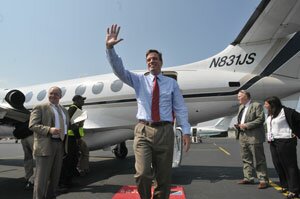
When he cashed out of a well-regarded presidential bid a year and a half ago, Mark Warner was just getting ready to take off.
PHOTO BY SCOTT ELMQUIST

Norfolk was among a half-dozen stops on Mark Warner's kickoff campaign to become Virginia's other Democrat in the U.S. Senate. Warner officially declared his bid for the seat in Abingdon on May 4, the first stop on a statewide tour that spanned four days.
PHOTO BY SCOTT ELMQUIST
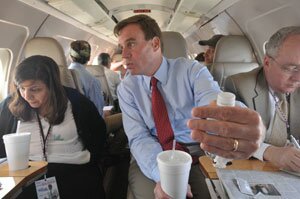
A tiny plane doesn't provide much wiggle room for Warner, working to convince reporters of his plan for bringing Republicans and Democrats together: he calls it the "radical center."
PHOTO BY SCOTT ELMQUIST
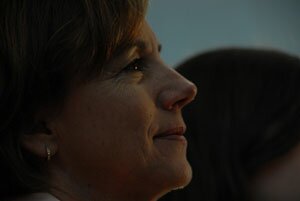
Warner says his family pre-empted a much-touted presidential exploratory bid. Now, with support of his wife, Lisa Collis, and their three daughters, he says he's ready to hit the campaign trail running.
PHOTO BY SCOTT ELMQUIST
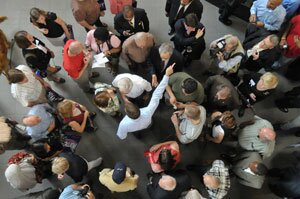
Warner the self-proclaimed 'radical centrist' points right and looks left during a meet-and-greet in Richmond.
PHOTO BY SCOTT ELMQUIST
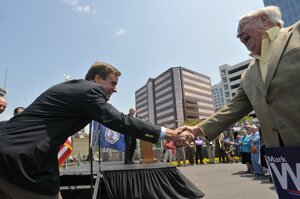
Warner reaches out and touches someone in a friendly crowd in Norfolk.
PHOTO BY SCOTT ELMQUIST
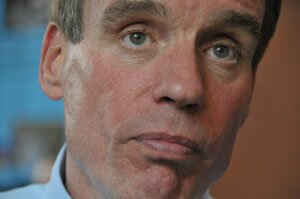
Despite his double-digit lead over former Gov. Jim Gilmore (R) in the latest polls, Warner insists that he will continue to hit the campaign trail hard, and that voters will have plenty of opportunity to get up close and personal with him.
PHOTO BY SCOTT ELMQUIST
#
3 comments
A nod's as good as a wink to a blind bat.
If my brain were a salad I'd eat it to gain the knowledge it contained.
Mama take me to da kitchen, gotta getz a peanut butter, gotta getz a peanut butter soon.